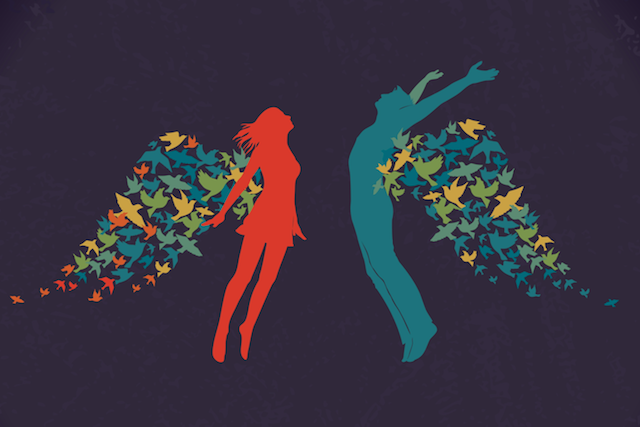
“Stress, depression, and anxiety are caused when we are living to please others.” ~Paulo Coehlo
I came from a broken and very poor family. My father left the house during my teenage years, and it was just my mother, little brother, and I remaining.
Like most single parents going through the hardships of singlehandedly caring for two children, my mother was often anxious about my well-being. And she overcompensated for her anxiety by being overbearing.
I unfortunately inherited this anxiety.
For the longest time, it was a daily battle for me.
You know the feeling.
Your muscles tense up, you feel an overwhelming sense of fear, and your heart begins to race.
It’s the uncomfortable worries that surface as you play out worst-case scenarios in your head.
Though we can feel anxiety about debt, work pressures, or any number of challenges, for me, it was mostly triggered by the fear of not being good enough and disappointing other people.
My struggle with anxiety was one of the most crippling experiences, and as a result, I never grew.
So, is it really possible to overcome anxiety?
I realized the answer is yes, but first I needed to understand where my anxiety was coming from.
Anxiety is Your Brain Trying to Protect You
There’s a small, almond-sized part of your brain known as the amygdala whose main job is to look out for your survival. For example, if a mountain lion were chasing you, your amygdala would trigger fear so that it would activate your body to run for your life or grab a weapon to fight.
Your amygdala doesn’t only watch out for your physical survival. You feel the same kind of fear when you are nervous about giving a public speech or going on a first date.
When you experience anxiety in these situations, it’s your brain’s way of trying to help you survive emotionally.
Unfortunately, your amygdala is not the greatest at accurately gauging how dangerous a situation might be. It often blows things way out of proportion.
I remember what it felt like when I was a kid and wouldn’t see my mother the whole day because she was always working late. I’d wait for her to talk about something I was excited about only to have her turn the conversation toward things about myself that I should be improving.
Even though this was her way of trying to make sure I survive in the world, because we were barely getting by, the constant requests to do things better made me feel like I wasn’t good enough.
It felt like no matter what I did, I could never fully please her. If I accomplished something she requested of me, I’d get a quick “thank you,” then she’d move on to talk about what else I should do.
I found it most hurtful when she would talk about how great someone else was. She’d update me about some amazing thing that one of her client’s children had accomplished and suggest that I should try to follow in that person’s footsteps.
All that did was make me think that something was wrong with me.
I ended up with low self-esteem, and because I thought I was worthless, nothing was scarier than the thought of making mistakes and failing, because that would confirm that I was not good enough.
This was why I never took too many risks and searched only for options that seemed to have a guarantee for success.
My anxiety made me develop a behavior of perfectionism, and it was ruining my life. The more I let it make my decisions for me, or lack of decisions for that matter, the further I felt from who I wanted to become.
Ironically, becoming a perfectionist was my brain’s solution to helping me feel good enough.
“Perfectionism is the belief that if we live perfect, look perfect, and act perfect, we can minimize or avoid the pain of blame, judgement, and shame. It’s a shield.” ~Brené Brown
This toxic behavior put me in an endless cycle of working hard to achieve all sorts of cool things so that one day, I might feel good about myself. In reality, every accomplishment felt anti-climactic. I was always dissatisfied and constantly looking for the next big accomplishment to chase.
No matter how much I succeeded, it was never enough for me, just like I never felt like I was enough for other people.
It wasn’t until I met someone who could see the real me that I finally figured out how to overcome my anxiety.
The Power of a Safe Space
When I was a teenager, a man named Anthony saved my life. If it weren’t for him, I would’ve gone down a much more self-destructive path.
He never questioned the mistakes I’d made unless I wanted to talk about them. And when I didn’t want to talk about them, he’d openly share his own horrible mistakes.
I never once felt judged by him, nor did I feel like he had a set of expectations for me.
Anthony helped me feel safe.
I realized for the first time that for most of my life, I didn’t feel safe to be who I was.
I was almost always in survival mode, shielding myself emotionally. All my behavior was in reaction to the anxiety of not feeling good enough for other people.
Being in a safe space finally helped me put my guard down and look at myself objectively. It was in these moments that I became deeply aware that being a perfectionist wasn’t the answer to my anxiety, and that I was heading down a path toward depression.
I didn’t come to this realization sooner because the pre-frontal cortex, the thinking part of the brain, is turned off when the brain’s in survival mode. This pre-frontal cortex is what’s capable of rational behavior, critical thinking, and emotional regulation.
The only way to calm down the survival mode of your brain is to place yourself in environments where you feel safe.
The thinking part of your brain will help you understand where your anxiety comes from and figure out an effective way to handle it.
It was in this safe space that I finally realized that I had the power and responsibility to stay true to myself.
How I Overcame My Anxiety
Deep down, I hated myself for constantly giving in to other people’s expectations of me and for letting their standards determine my self-worth.
But the reality is that I let this happen.
And here’s the even harsher truth.
I let it happen because it’s much easier to live a life that someone else wants you to live.
The scariest part is that once you take ownership of the one life you have, you have no one to blame if things go wrong. At least following someone else’s path gave me the right to blame him or her.
My brain would rather me let others’ standards dictate my life and sacrifice my mental health than do anything that might make me experience the emotional pain of looking like a failure and falling short of someone’s standards.
Now that I knew all my anxiety was coming from my brain being in survival mode, I needed to figure out a way to regularly calm it down.
This was when I discovered meditation.
I learned that brain scans in studies have revealed that meditation calms the amygdala and activates the thinking part of your brain.
I started using the free version of an app called Headspace, and I learned how effective it can be to simply be present and enter a state of awareness.
For most of my life, I’d been tossed left and right by my circumstances and was a slave to my emotional reactions. Meditation helped me become more aware of why I was behaving the way I did, especially in these reactive moments.
I finally saw that almost all my anxiety led to irrational thoughts and behaviors.
For example, I remember when I decided to start my business, it was hard to build my audience. Nobody was reading any of my articles, and I wasn’t getting any traffic on my website.
I’ve given up on other ventures plenty of times before, and I was ready to give up on this one too. I took it personally and started telling myself the familiar narrative that I didn’t have what it takes. I just wasn’t good enough. Then I recognized that I was reacting to my anxiety as I’d always done, and I could choose a different way.
I was able to be aware and think to myself, “I’m feeling anxious right now because this moment feels similar to a couple of painful experiences I had in the past.”
The moment I became aware of this I gave myself the power to make a choice rather than to habitually react.
So I told myself, “The old you would put yourself down and give up, but the new you can try to assess the situation objectively and see what is really setting you back.”
After doing this, I was finally able to grasp that I didn’t have business challenges because of my character, but most likely because of the strategies and tactics I was using to market myself. Once I used different strategies, I got different results.
Your Best Life Starting Now
In order to live our best life, we have to calm our anxiety about disappointing other people and not being good enough and find the courage to be true to ourselves.
It is one of the hardest decisions you will ever make, but it will also be one of the best.
The first step to changing my life for the better was having awareness. The next key step was focus.
What you focus on is usually what you will gravitate toward.
The key to living your best life is not to run away from who you were, but to run toward who you want to become.
As I meditated, my anxiety calmed down and I started to have such a clear idea of the person I wanted to be.
I no longer wanted to be the anxious person who thought he was worthless. I wanted to become a great husband, father, and leader. Rather than worrying about not being able to meet these expectations, I started to engage the thinking part of my brain to figure out what needed to be done.
I didn’t have all the answers, but I knew I could only make this life I wanted a reality if I started making changes and learned as I went.
I wanted to learn what it took to become a better husband, so I started going to marriage counseling.
I wanted to become a better parent, so I researched how children are wired and how to best communicate with them.
I wanted to be a better leader, so I invested in credible leadership and coaching courses.
And I did these things not because I wanted to prove something to myself, but more because it mattered to me deeply and I knew it was a part of who I truly was.
I’ve spent too much time running away from opportunities for growth because I was afraid I might not be good enough. The problem, though, was that I was running away without knowing where I wanted to go. I ended up in destinations where I felt more lost than ever, and my anxiety kept catching up to me in the end.
Now, whenever I experience anxiety, I tell myself, “This is anxiety.” I thank my brain for looking out for me and then I ask myself, “What do I need to focus on in this moment, and how can I get it?”
Then, surprisingly, the anxiety calms down and the thinking part of my brain activates to try and figure out the best way to go about things.
This is what changed everything for me.
And I know it can for you too.
While people might have expectations for you, the world desperately needs the power that comes from you living your most authentic life.
If you are battling anxiety about not being good enough or pleasing other people, take a moment to slow down and acknowledge what you are experiencing. Then, identify what you need to feel safe so you can turn on the thinking part of your brain and start uncovering the answers you most need. That might mean meditating, talking to a close friend, or even just getting out in nature for a walk.
It’s time to take a deep breath, be compassionate with yourself, and decide who it is you want to be.
Stay aware and focused and you’ll be there sooner than you think.
About Eugene Choi
Eugene works with professionals who are frustrated because they’ve made it as far as they can go and start to feel stuck. His unique method of coaching helps them figure out what their next steps can be whether it’s a way to grow within their company or even switch careers. Download his free guide to help find your unique calling here.













 Though I run this site, it is not mine. It's ours. It's not about me. It's about us. Your stories and your wisdom are just as meaningful as mine.
Though I run this site, it is not mine. It's ours. It's not about me. It's about us. Your stories and your wisdom are just as meaningful as mine.
Thank you for writing this.
I really needed to hear this today!
Yay! I’m glad it was helpful! 🤗
I love your article and can relate so much. I must ask – how is your relationship with your mother now? Has she changed? Do you have a relationship with her??
Hi Lori! Yes! My relationship with my mother has been good! A lot has happened over the years, but there is a much higher level of understanding between us now and I’m glad to share that she supports me wholeheartedly. 🙂
Wow Eugene I really loved your post and feel like very much of my childhood and teenage years are being represented in your experience. My mother is a teacher so I felt directly the constant comparisons and continuous demand for more and better. To this day, I think I still live my life considering more of other people’s expectations than mine…but at least I started to be aware of this and work on changing it. TinyBuddah is a very important resource and I am thankful for your post today!
Thank you much!! It means a lot to me that you resonated with my work. It’s nice to know I’m not the only one that went through these kinds of experiences. 🙂
Wow, are you me?? Haha! Reading through the first part of your article –
that describes my life perfectly. The anxiety, the never being good
enough. Very good. Thanks for sharing!
Thank you so much for reading!! 🙏🏻 Glad it was helpful 🙂
Hi Eugene, these lines from the article really stood out to me: “[Perfectionism] was why I never took too many risks and searched only for options that seemed to have a guarantee for success. / My anxiety made me develop a behavior of perfectionism, and it was ruining my life. The more I let it make my decisions for me, or lack of decisions for that matter, the further I felt from who I wanted to become.” – For a long time, I wouldn’t admit I was a perfectionist because I thought I couldn’t be, since I never did anything perfectly, but the reality was I didn’t DO anything because I was too scared of not being perfect. I’m so glad you tackled that anxiety beast in your brain to keep working at your business.
The makings of an excellent man 🙂 I am not a stranger to being neglected and having my self-esteem crushed by harsh criticism [since early childhood] I’ve struggled to overcome my lack of self-love and lack of self-esteem and total fear of not being good enough. It’s really hard, but it’s great to find someone who’s also been lucky enough to have settled some inner turbulence/imbalance/disharmony 🙂 Thank you very much for sharing your story 🙂 All the love and support 🙂 Thanks! <3
I’m just realizing that I experience a nervous breakdown every time I launch a new project, as most have failed in the past, because I don’t stick with them. I definitely feel like the root of my issues is feeling not good enough, for most of my childhood and during these career transition I’m in. So thank you so much for sharing, this helped me see myself from a different perspective 🙂